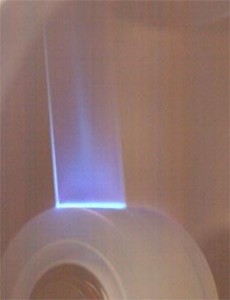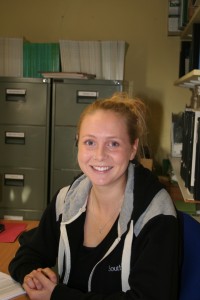Sticky tape X-ray generator
July 23, 2015
by Henry Smith
Part of the EPSRC Vacation Bursaries Scheme 2015
Student name: Edward Briggs and Henry Smith
Student degree course: MChem (Chemistry)
Year of study: End of 2nd year
Supervisor: Jeremy Frey
Vacation Bursary Research project title: Sticky tape X-ray generator
Tell us a bit about you and your chosen research field:
We are both going into our 3rd year of study and both have a specific interest in physical chemistry, the project involves working as a pair alongside the rest of the Frey research group to explore more about the strange phenomena of triboluminescence which is responsible for the generation of photons via peeling sellotape, this effect also happens when sugar cubes are crushed.
Tell us about your specific research project:
The aim of the project is to unravel sellotape in a vacuum and analyse the results. It has been widely reported that when tape is unravelled at moderate speeds photons of high energy including X-rays are emitted (but only when in a vacuum). It has also been previously documented that at atmospheric pressure a blue glow is observed. We will be exploring these effects fully by adding to a group of engineer’s work which was completed as part of their masters.
Using Lego we are to create a motor to dispense the tape at various speeds and image these phenomena. Ultimately, once completed this experiment will be used in outreach programs by the chemistry department at the university as well as (hopefully) gaining a better understand of this effect.
 Describe any future plans regarding on-going study/postgraduate research connected to your Vacation Bursary project:
Describe any future plans regarding on-going study/postgraduate research connected to your Vacation Bursary project:
We are both doing a 4 year course including a 6 month placement, and must undergo a research project next year. The research project takes place throughout the whole year with the possibility to continue on our current project. The 6 month placement can be in industry or academia and there are a range of physical chemistry placements to apply for.
Socioeconomic correlates of the planet’s key ecosystem services
July 22, 2015
by Sophie Watts
Part of the EPSRC Vacation Bursaries Scheme 2015
Student name: Sophie Watts
Student degree course: BSc Biology
Year of study: 3
Supervisor: Dr Simon Willcock, Dr Kelvin Peh and Dr Marije Schaafsma
Vacation Bursary Research project title: Socioeconomic correlates of the planet’s key ecosystem services
 Tell us a bit about you and your chosen research field:
Tell us a bit about you and your chosen research field:
I have studied two years of Biology at Southampton and have completed placement with the Game and Wildlife Conservation Trust (GWCT) using Geographic Information Systems (GIS) and carrying out wildlife conservation fieldwork. My main passion lies within the conservation and environment branches of Biology, and this internship will involve a level of data handling and analysis above and beyond anything I have done before, while still being relevant to my personal interests.
Tell us about your specific research project: The overall research project is linked with four on-going projects (ARIES, ASSETS, TESSA and WISER) that aims to investigate the links between health, development and ecosystem services on a global scale. In order to achieve these aims there are three subprojects that I am working on:
- Ecosystem Services and Development
- Ecosystem Services and Health
- Socioeconomic correlates of non-timber forest product utilisation
Within each subproject there is an element of data handling followed by analysis using software such as ArcGIS, Microsoft Access and R, the latter two I have not used before and I am keen to develop these as skills. Within this project there is an opportunity for me to assist in report writing which would improve my scientific writing and be useful for future research reports including but not limited to my third year dissertation.
Describe any future plans regarding on-going study/postgraduate research connected to your Vacation Bursary project:
This project has highlighted to me the importance of effective data management systems and in the next academic year I will study the Electronics and Computer Science (ECS) module COMP1204: Data Management to improve my skills in this area. It has always been my intention to continue to postgraduate study and this project has increased not only the appeal but also the likelihood of succeeding in a competitive research environment.
An Ambient Display for Non-domestic Energy Consumption
July 20, 2015
by Edward Cater
Part of the EPSRC Vacation Bursaries Scheme 2015
Student name: Edward Cater
Student degree course: Computer Science
Year of study: 2nd
Supervisor: Enrico Costanza
Vacation Bursary Research project title:
Tell us a bit about you and your chosen research field:
Having recently completed my second year of Computer Science at Southampton, I am currently undertaking a ten-week internship with the University’s Agents, Interaction & Complexity (AIC) research group. I will be working primarily with the HCI-focused members of the research group, designing interactive systems based around reducing energy consumption.
Tell us about your specific research project:
My project focuses on helping building inhabitants become aware of the impact of intervening with the building’s heating system (by manually adjusting the thermostat). To accomplish this, I am developing an ambient, always-on display, suitable for deployment in non-domestic buildings such as libraries. For this reason, I will be developing a web-application for use with a tablet embedded in the environment.
The display will update regularly. Some of the display’s features may include:
- Current temperature.
- Today’s highest and lowest temperatures reached
- Current expected cost of heating
- Predicted cost of heating if the temperature were to be raised/lowered by 1°C.
- Some way for the user to interact with the system. Possibly by giving emotional feedback.
Of course these are just examples. It is entirely possible that features will be removed or added as I iterate the display’s design.
The display is being developed using Django; a Python web framework.
Describe any future plans regarding on-going study/postgraduate research connected to your Vacation Bursary project:
I’m thoroughly enjoying my time here and I am now seriously considering post-graduate study at Southampton, perhaps in HCI or possibly even a field I’m yet to experience, such as Machine Learning or Computer Vision.
Before starting the project, web development was completely alien to me and I had minimal experience with Python. This internship has been an opportunity to dedicate myself completely to something new, and I have learned a lot in a very short amount of time. The post-graduates in the labs have been immensely helpful, and I have been exposed to real-world research for the first time. I look forward to working more closely with some of the researchers in the future.
Give a man a fish and you feed him for a day; teach a man to fish and you feed him for a lifetime
July 20, 2015
by Jonathan Sandman
Part of the EPSRC Vacation Bursaries Scheme 2015
Student name: Jonathan Sandman
Student degree course: MEng Acoustical Engineering
Year of study: 3
Supervisor: David Simpson
“Give a man a fish and you feed him for a day; teach a man to fish and you feed him for a lifetime.”
It might seem odd to attribute such a quote to an engineering degree, but bear with me; it actually makes an awful lot of sense.
One of the things that I have found so rewarding about studying engineering is the wide range of problems to which it may be applied; over the past 3 years of my course (still 1 more to go!) I have found myself involved in projects ranging from bridge design to auditorium acoustics, from building a loudspeaker to assessing beat detection algorithms.
In many degrees, having such a broad subject area might weaken it’s value: not in engineering. It might seem that I have been culling opportunities with decisions as far back as GCSEs. On the contrary, the opportunities that I have seem greater than ever.
An area of engineering that I am interested in, but have never had the chance to explore, is biomedical signal processing; that is, the analysis of measurements using signal processing techniques in order to advise clinical decisions. My individual project involved a lot of signal processing, which is thoroughly enjoyed, and I feel that the next step for me is to now apply these skills to something more involved in human response.
Although I am going to be involved in a few different projects throughout my research placement in slightly different areas, I am currently familiarising myself with and editing cerebral blood flow measurements for the purpose of using it to assess the cerebral pressure autoregulation function in humans. I am also planning on taking part in future tests and liaising with MSc Audiology students in order to better understand the physical meaning of the data that I am working with, and how we might use it to investigate cerebral pressure autoregulation or develop better methods of measurement
I am hoping that my research placement will introduce me to, and develop my knowledge of biomedical signal processing ahead of the module that I am taking next year. It has also opened my eyes to the myriad of opportunities that are available in research, and although I do not consider myself a candidate for a PhD, I discovered during my individual project that I find research both rewarding and enjoyable, and would like to continue to explore this further.
Adaptive Sockets for Lower Limb Prosthetics
July 17, 2015
by Luke Stoneman
Part of the EPSRC Vacation Bursaries Scheme 2015
Student name: Luke Stoneman
Student degree course: Mechanical Engineering
Year of study: 4th Year
Supervisor: Dr Liudi Jiang
My chosen engineering theme is Advanced Materials, giving me versatility in terms of skills of numerous engineering disciplines and project choices. I feel I have an affinity to studying fundamental materials and manufacture methods, such that the Advanced Materials theme has been an enjoyable one. Projects I have pursued include my extra-curricular work with autonomous robotic systems, as well as my Individual project based on analysis of high performance protective coatings for the aerospace industry.
Tell us about your specific research project:
This specific project further expands my knowledge of the potential applications of material properties. In lower limb prosthetics, the greatest challenge lies at the interface between residual limb (stump) and artificial socket. A prosthetic socket is an integral part of any prosthesis and provides an essential function in tightly joining the stump to the prosthesis. Ill-fitted sockets could cause daily discomfort, reduced prosthesis usage and soft tissue injuries in the form of stump ulcers. My project focuses on material development with a view to ultimately improving comfort and stump health for lower limb amputees.
Describe any future plans regarding on-going study/postgraduate research connected to your Vacation Bursary project:
From this research, I hope to benefit from the project skills used throughout. These include conducting comprehensive literature reviews, designing relevant experimentation methods, and materials characterization within a short time scale. Practising such processes will be a strong asset leading into my 4th year Group Design Project and Advanced Materials modules. This project also allows me to apply my advanced materials knowledge thus far to prosthetic research areas, which could help improve quality of lives of amputees. Therefore, providing successful research outcomes from this project will be personally very rewarding. I foresee myself with continued interest beyond the Vacation Bursary scheme, such that I may find myself affiliated with similar future research within the university.
